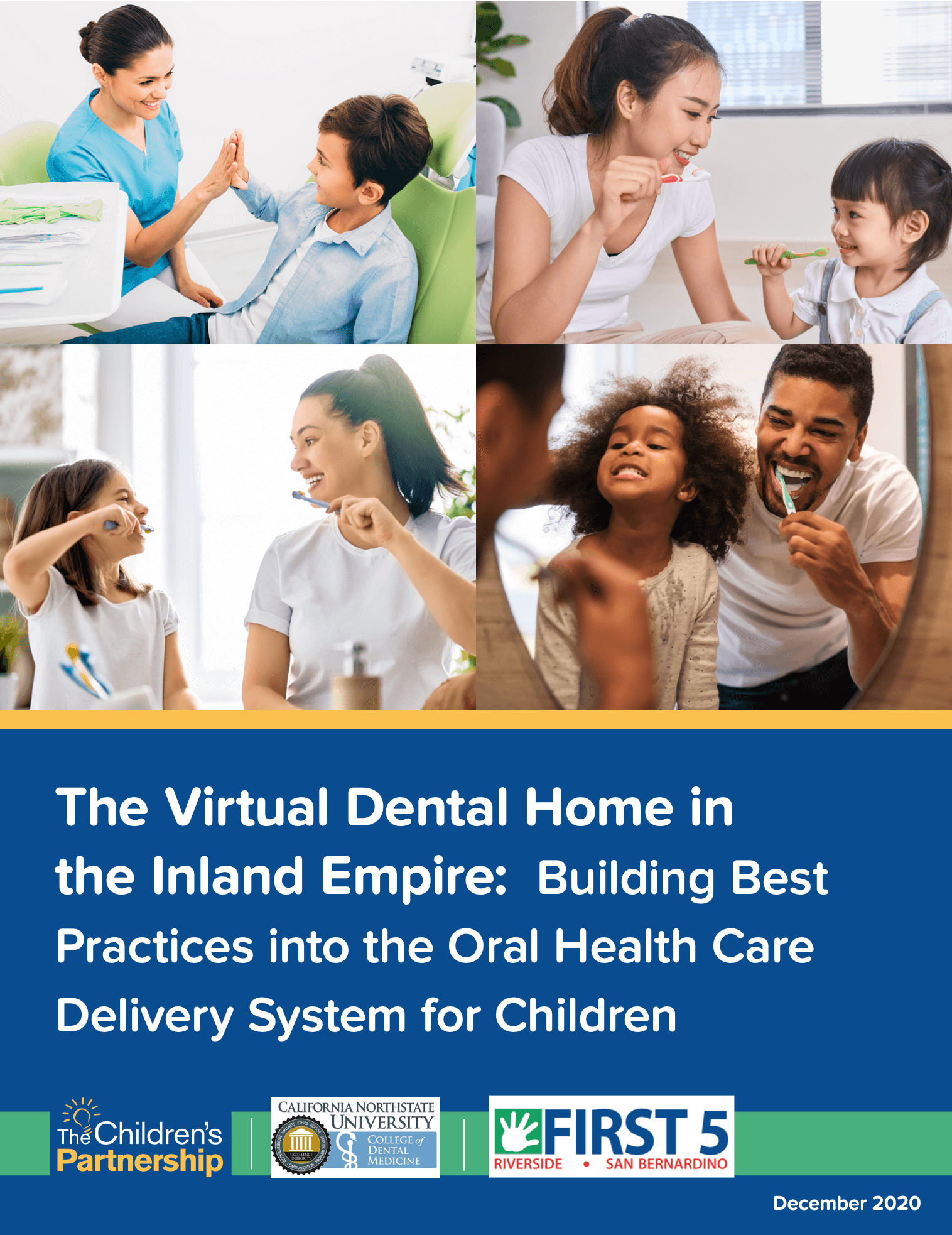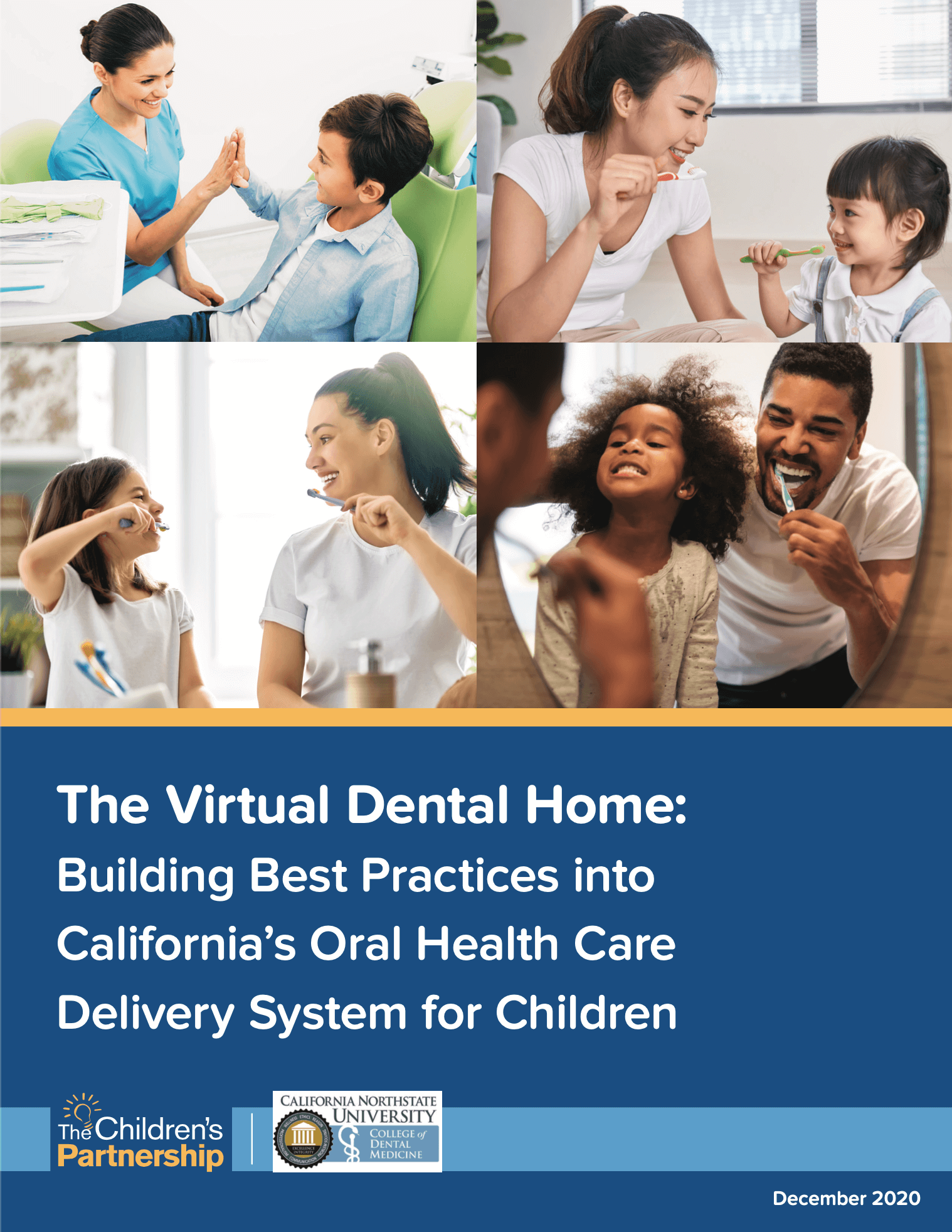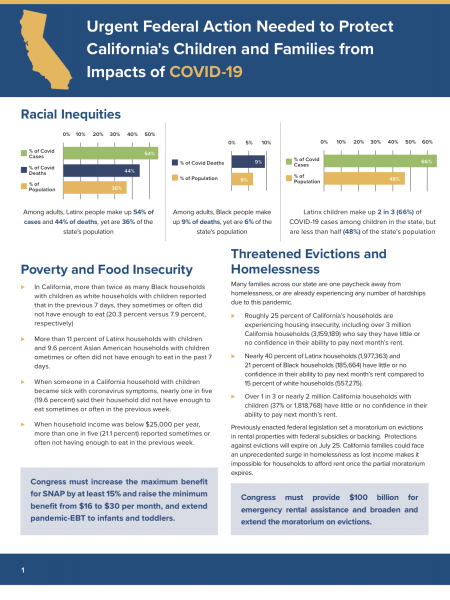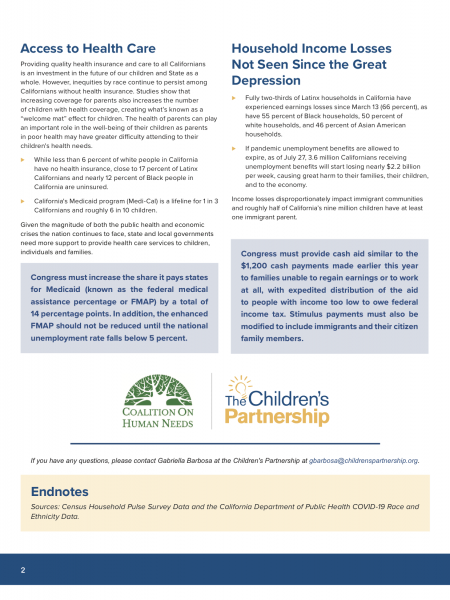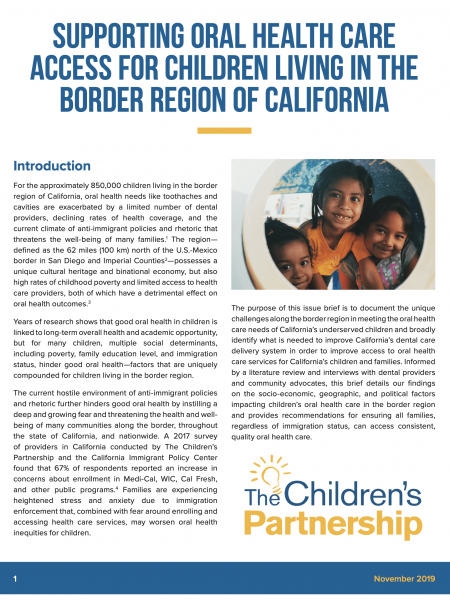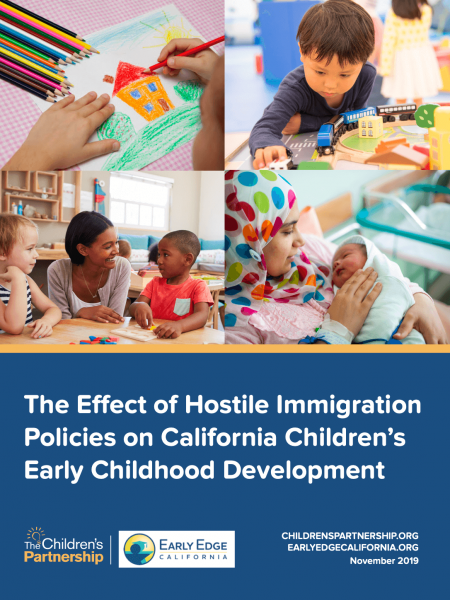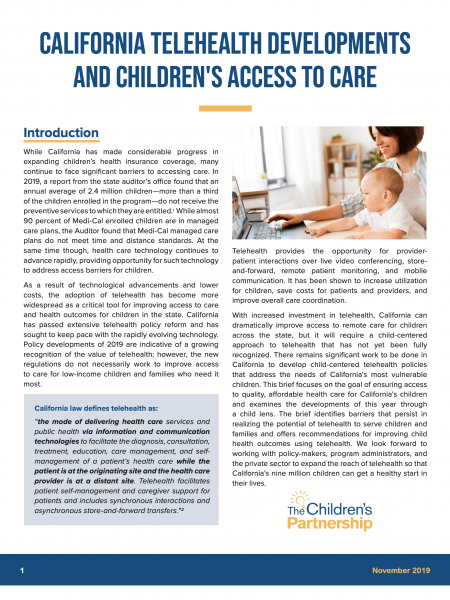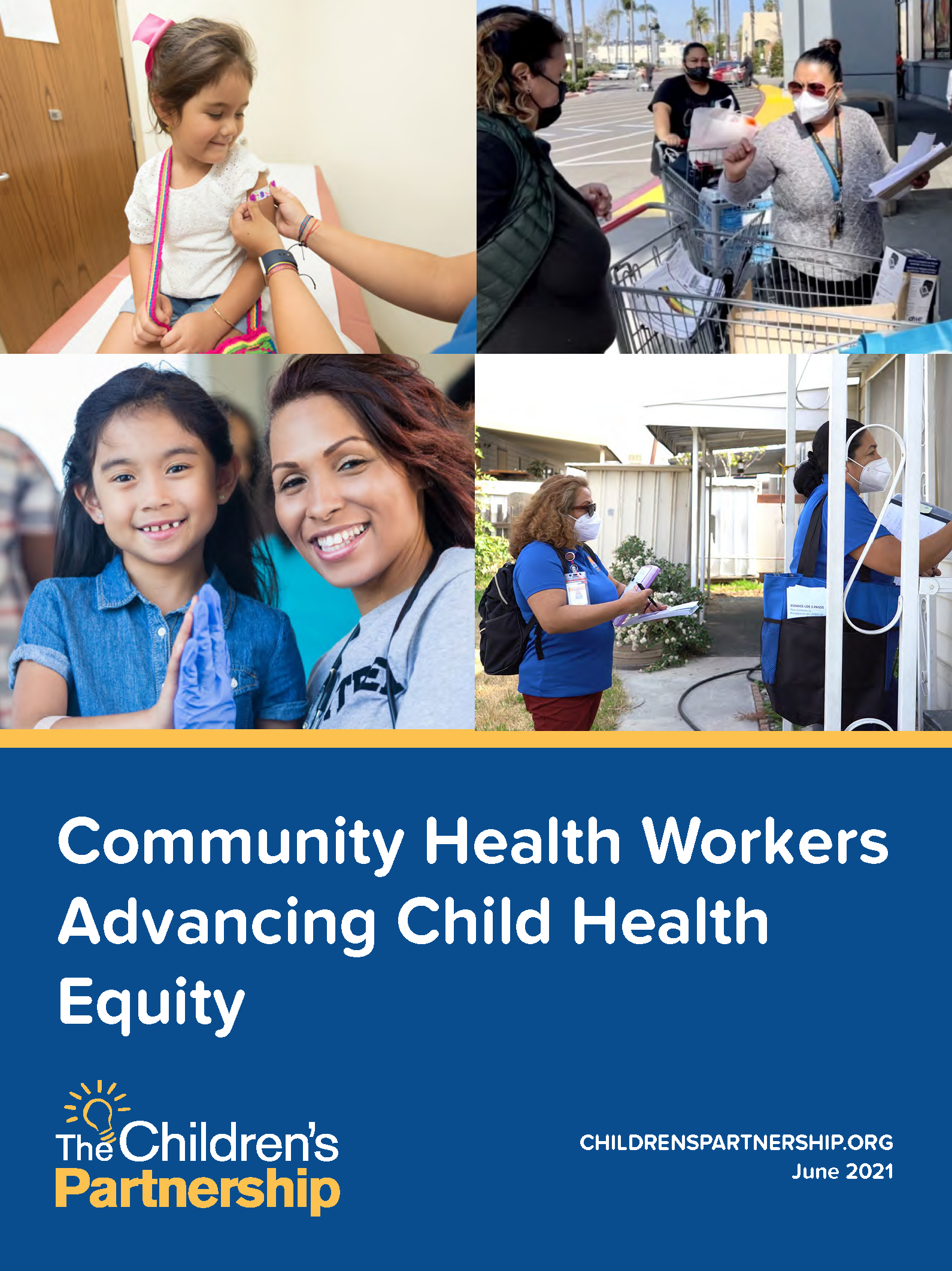
Racism impacts every state of a child’s development and continues to harm children by shaping the conditions in which they live, learn and play.
Health care in the United States is marked by centuries of racial injustice and myriad forms of violence against BIPOC communities. BIPOC communities have challenged and actively subverted racist structures in medicine to care for their own health by utilizing community-defined practices and care.
Our newest brief, Community Health Workers Advancing Child Health Equity, focuses on the community health workforce as a community-led, anti-racist solution in health care delivery for children. This brief explores the power of a community health workforce in advancing child health equity and dismantling systemic racism.

Background
One year after the United States declared a public health emergency due to COVID-19, families across California continue to struggle. We once again partnered with the Education Trust West and other partners on a survey of 600 parents of children ages 0-5 in California. Conducted during the first two weeks of February 2021, this survey follows an earlier survey conducted in late April 2020.
Key Findings
Many California families have been struggling to meet their basic needs even before the pandemic began due to systemic racism and historic under-investments in low-income communities of color. These findings show that the pandemic continues to exacerbate inequities in health, mental health, and social determinants of health.
(1) Parents have ongoing and intense concerns about the impact the coronavirus is having on the mental health of themselves and their family, as well as their child’s development and overall well-being.
- Mental Health: 70% of parents worry about their and their family’s mental health as a result of the pandemic. 87% of parents agree that receiving referrals to mental health clinics and providers could help them but only 13% currently have received or have access to referrals.
- Socialization: 73% agree they worry about their child’s ability to socialize with other children because of the pandemic
- Education and Development: 74% agree they are worried that their child’s education and development are suffering because of the pandemic
(2) California’s parents of young children continue to struggle with financial and job-related insecurity.
- Unemployment: Unemployment and temporary loss of work are disproportionately impacting low-income parents and Latinx families — 1 in 3 (35%) low-income parents with young children are experiencing unemployment and nearly 1 in 4 (23%) Latinx families with young children are experiencing unemployment compared to one in 10 (15%) of all families with young children.
- Finances: Finances are particularly concerning for low-income parents and parents of color: 59% of low-income parents and 40% of parents of color, including 43% of Latinx parents, say they feel uneasy about their personal finances over the next several months (compared to 33% among parents overall).
- Pay/hour reduction: Even among employed parents, over a third (37%) say that they have had their pay or hours reduced as a result of the coronavirus pandemic (a five-point increase since April).
(3) California’s parents of young children continue to experience significant hardship around expenses that support basic human needs like food and housing.
- Basic human needs: 1 in 3 (34%) parents with young children overall are concerned about affording expenses that support basic human needs like food and housing – the number increases for low-income parents and parents of color: Over 1 in 2 (59%) percent of low-income parents and 40% of parents of color, including 42% of Latinx parents, say they are unsure or will not be able to afford basic expenses like food and housing.
- Skipping or reducing meals: As a result of these ongoing issues, over the last year parents have continued to compensate for a lack of steady income, fears of future financial instability, and food availability. Over a third of parents of young children in the state (36%) say they have skipped or reduced the size of their own or their child’s meals as a result of the coronavirus crisis, down just six points from the beginning of the pandemic. That number increases significantly among low-income parents: nearly 1 in 2 low-income parents (46%) say they have skipped or reduced the size of their own or their child’s meals as a result of the coronavirus crisis.
(4) Parents are struggling with accessing health care for themselves and their children during the pandemic.
- Public Health Insurance: 1 in 2 (50%) of parents sought to enroll in state sponsored health insurance (Covered CA or Medi-Cal) after losing their employer-sponsored insurance. Over a third of parents overall (34%) have attempted to enroll themselves or their family in Medi-Cal during the pandemic. For many parents, enrolling in Medi-Cal was not easy — half (50%) stated that they had problems and/or issues when applying and enrolling in Medi-Cal; the most common being the need for a lot of follow-up (23%), found the application confusing (21%) or couldn’t reach a county worker to apply (18%).
- Telehealth: Slightly over a quarter of parents overall (26%) say they have not been able to access medical care using telehealth during the pandemic. For those who have been able to access medical care using telehealth, 94% were satisfied with their experience. The vast majority (94%) of parents agree that accessing their child’s doctor via telehealth could help them, but only 48% currently access their child’s doctor using telehealth (this number has increased significantly since the April 2020 survey; at that time, only 18% of parents currently had access to their child’s doctor using telehealth).
- Well-Child Visits and Immunizations: 32% of parents say they have missed well-child health appointments for their child since the pandemic first began. 18% of parents have missed immunizations for their children.
(5) There are a number of supports that could help parents of young children during the pandemic, but not all parents have access to them.
- 88% of parents indicated that extending financial and social supports to all California families, regardless of immigration status, would help parents with young children
- 94% indicated that providing parents access to their child’s doctor via telehealth through technology like a computer, tablet, or telephone would help parents with young children, but only 48% currently access their child’s doc using telehealth (was 18% in April 2020)
- 93% indicated that connecting parents to that can help with food, housing, employment, health, and other emergency needs would help parents with young children, but only 20% currently have access to to these supports
- 87% indicated that providing referrals to mental health clinics and providers would help parents with young children, but only 13% currently have access to referrals
Policy Recommendations
Based on the results of this poll, we have identified the following policy recommendations that address the challenges impacting families with young children in California:
- Invest in community-centered mental health services.
- Create whole-family wellness hubs in our most under-resourced communities that connect families to social supports such as housing, health care, legal services, and education.
- Streamline enrollment across public benefits programs to make it easier for families to enroll in programs and quickly access health, food, housing, and other supports.
- Increase investment in food and other public benefits programs available to all families regardless of their immigration status.
- Provide more access to health and mental health services through continuous coverage in Medi-Cal for young children 0-5 post-pandemic and for 12 months postpartum.
- Advance digital equity and increase community engagement and outreach in order to expand access to telehealth services.
For more data from the survey on other topics including child care, click here. For more policy recommendations from our partners, click here. For a recording of the poll briefing, click here.
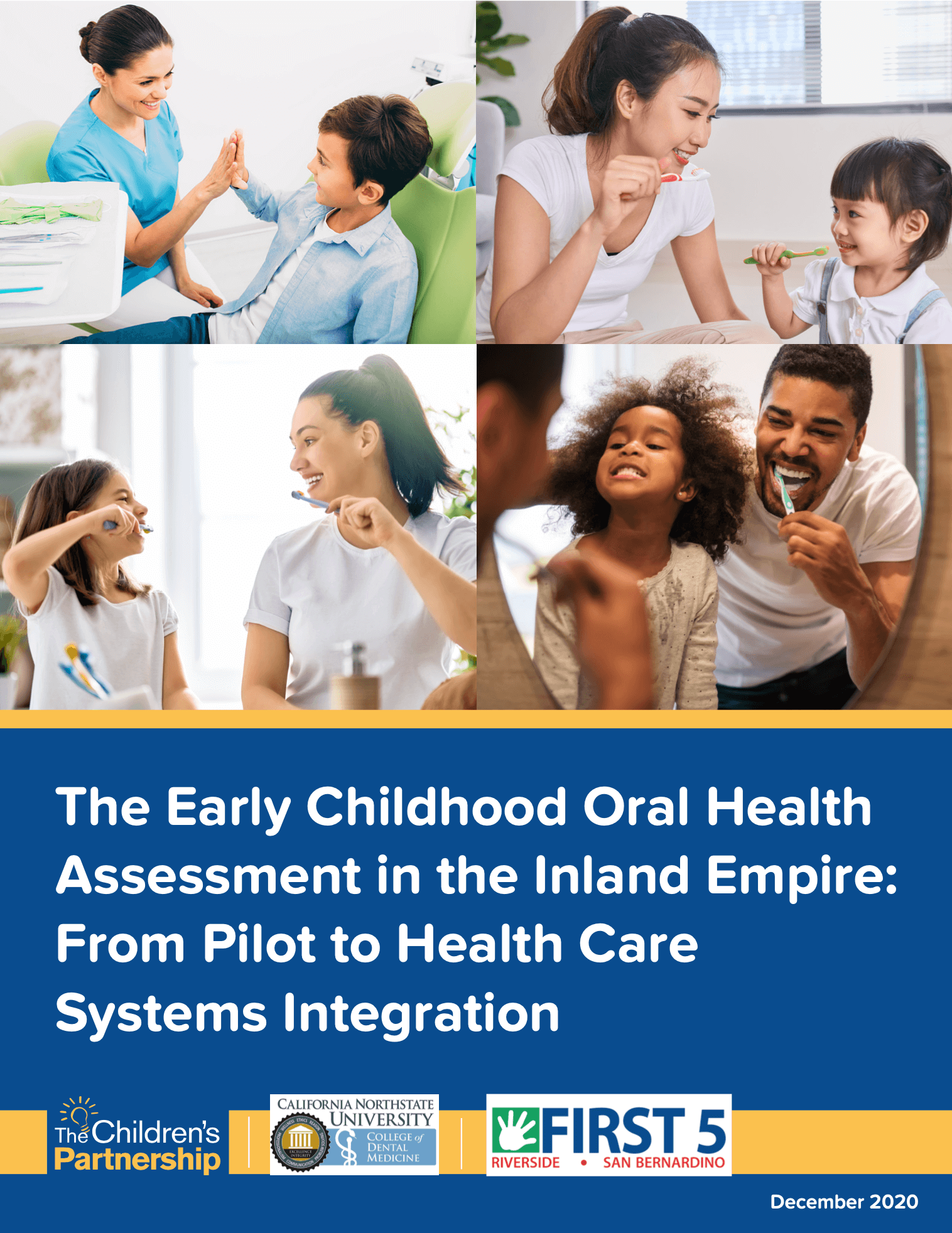
Over the past five years, California’s Dental Transformation Initiative has increased access to care and utilization of dental services for children enrolled in Medi-Cal. As part of this initiative, TCP has co-led the implementation of a Local Dental Pilot Project in the Inland Empire which has addressed the oral health needs of children, particularly children of color and low-income children, through innovative, technology-based strategies that bring care into the community.
As the pilot comes to a close at the end of 2020, we are proud to co-release three issue briefs with our partners detailing the implementation, the lessons learned, and the best practices of the Virtual Dental Home and the Early Childhood Oral Health Assessment in the Inland Empire, as well as the implementation of the Virtual Dental Home statewide.
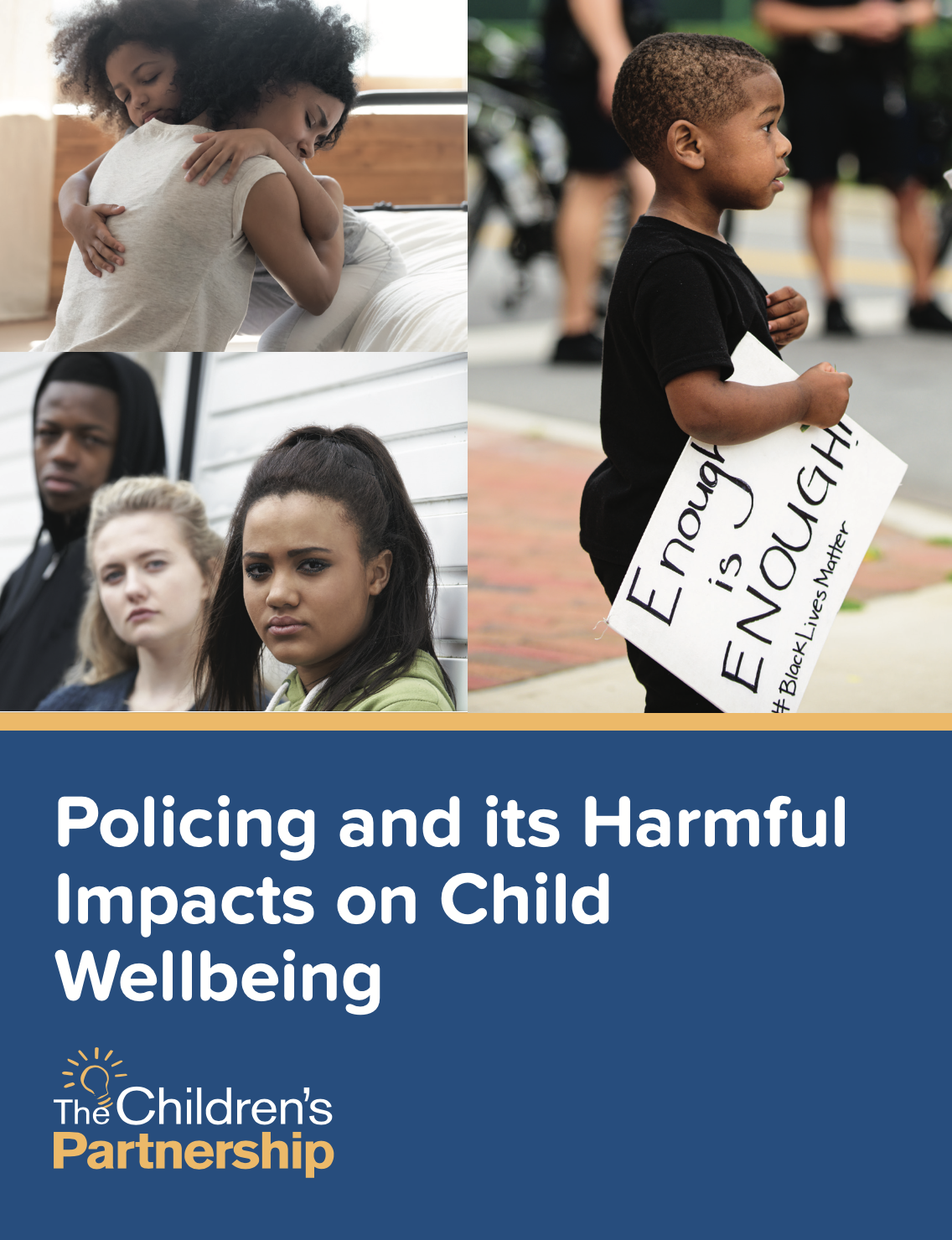
Policing and its Harmful Impacts on Child Wellbeing
Our first brief in the Racism and Child Health series, Policing and the Harmful Impacts on Child Wellbeing, offers a look at how the systemic racism that permeates U.S. law enforcement harms the health of BIPOC children. Whether direct or indirect, exposure to police violence triggers a stress response in children that leads to lasting adverse consequences from mental health and development to financial and academic success.
TCP aims to be a voice for marginalized communities and advocate for equity in health for all children. This brief highlights how systemic racism in policing leads to inequities in health for BIPOC children and offers opportunities to address the harms and prevent future negative impacts.
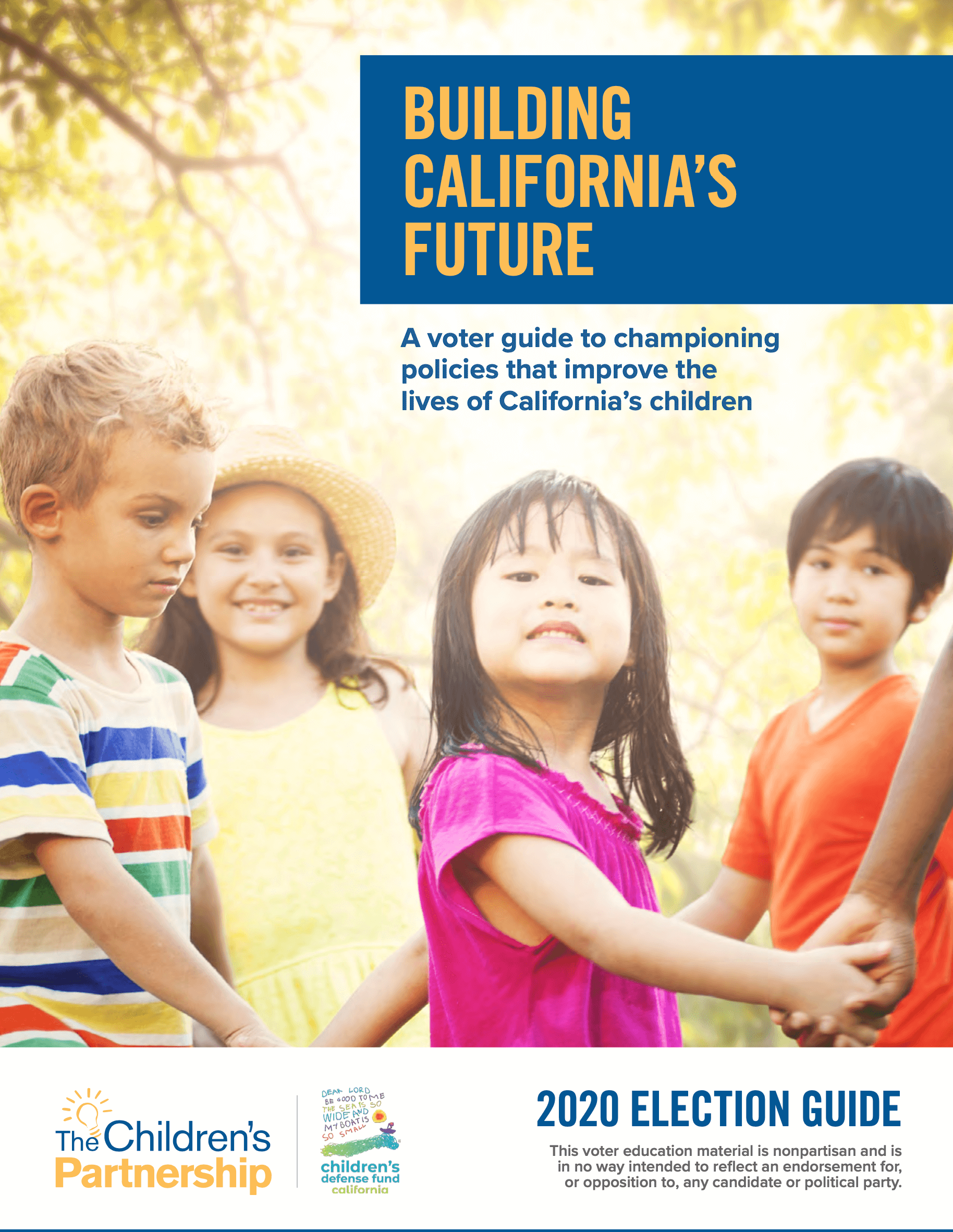

True representation requires us all to elect leaders with a vision to create a just and equitable world for every child in our nation and in California. All of our newly elected leaders will face critical policy decisions that have the power to improve the lives of children of color, and children living in poverty. Our dual pandemic, institutional racism and COVID-19 have created a new level of urgency to understand the complexities and needs of our communities.
TCP in collaboration with The Children’s Defense Fund-CA is launching, “Building California’s Future 2020: A Voter Guide to championing policies that improve the lives of California’s children.” Learn about the issues being faced by children and families and what to consider as we, the people, engage in civic engagement.

Federal action is urgently needed to help California families keep food on their tables, maintain stable housing and access health care services.
The COVID-19 pandemic continues to disproportionately devastate California’s Latinx, Black, Pacific Islander, and immigrant children and families, while these very communities shoulder the front-line work keeping our state’s economy running. For example, in L.A. County, Pacific Islanders suffer the highest infection rate of any racial or ethnic group at more than 2,500 cases per 100,000 residents, six times higher than for white people. At the state level, among children, Latinx children make up 2 in 3 cases, despite making up less than half of the state’s population of children.
Our children deserve to see our country care for every member of our society by valuing and supporting them through this unprecedented crisis. Without federal support, trigger cuts to health and safety-net programs could be back on the table.
We partnered with the Coalition on Human Needs to highlight alarming inequities that California children and families are facing including housing instability, food insecurity, income losses, and access to health care.

In its prioritization of early childhood development, California must seek to create a coordinated system of programs, policies, and services that promotes the healthy development of, and responds to the needs of, young children and their families.
Young children are able to thrive when their families have access to the tools and resources necessary for a healthy and nurturing environment. A team of providers, legal advocates, and family specialists offers a new family the concrete support and services that address a family’s needs and help minimize stress caused by challenges.
The integration of legal partners into the early childhood system is a community-level intervention to advance health equity and address the social determinants of health.
Our new brief highlights five legal partnering initiatives serving families with young children in different regions of the state.
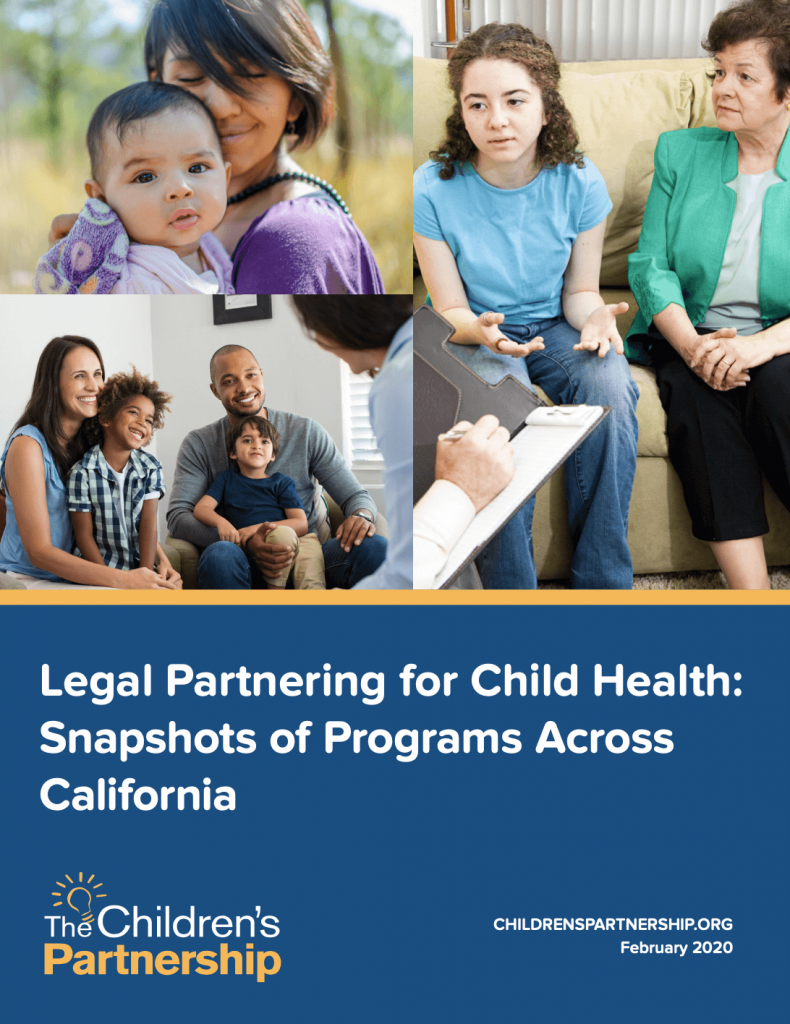
Each snapshot of the programs discusses practices and offers strategies to help policymakers in California ensure young children, particularly those from marginalized communities, feel safe, healthy, and ready to learn.

For children living in the border region of California, oral health needs like toothaches and cavities are exacerbated by a limited number of dental providers, declining rates of health coverage, and the current climate of anti-immigrant policies and rhetoric that threatens the well-being of many families.
We know that good oral health in children is linked to overall health and academic opportunity, yet for too many children in the border region, multiple social determinants, including poverty, family education level, and immigration status, hinder access to oral health care—factors that are uniquely compounded for children living in the border region.
In partnership with community organizations and providers in San Diego and Imperial Counties, we sought to better understand the state of oral health care for children, and especially children in immigrant families, living in the region.
In Supporting Oral Health Care Access for Children Living in the Border Region, we document the unique challenges in supporting the oral health needs of children in the region and provide recommendations for ensuring all families, regardless of immigration status, can safely access quality oral health care.

What do you do when a worried parent asks you to take care of their four-
year-old if Immigration and Customs Enforcement (ICE) deports them? For
early care educators, childcare workers, home visitors, and preschool
teachers, these types of questions have become more common.
Our latest report, The Effect of Hostile Immigration Policies on
California Children’s Early Childhood Development, written in
partnership with Early Edge California, examines the effects of this hostile
climate on our youngest Californians and the early childhood workers who
support them.
Nearly half of California’s three million children under five years old
are children of immigrants.
With the spread of anti-immigrant policies, many immigrant families are
fearful of utilizing health, nutrition, early education, and essential services
that impact their children’s wellbeing. Over 1.3 million California children
are at risk of losing out on their basic needs, which, compounded by the
stress, anxiety and instability their families are experiencing, has a direct
impact on their healthy, normal development.
As caregivers, early childhood education (ECE) providers understand the
importance of basic needs like food, housing and health care to a child’s
early learning and development. Yet ECE staff face new challenges of how
to support families facing fear, economic stressors, and disruptions to their
lives. With one in five early childhood providers identifying as immigrants
themselves, the emotional burden can be exceptionally high.
By building the capacity of our early childhood workforce to respond to
trauma, creating safe spaces for all families, and fostering connections
between child-serving systems, we can better support early childhood staff
and the children they serve. With unprecedented commitments to early
childhood development made by California state leaders like Governor
Gavin Newsom, now is the time to make sure our youngest Californians are
set up to thrive.

Our recent brief, California Telehealth Developments and Children’s Access to Care, summarizes the state of recent advancements in children’s health through telehealth, or the delivery of health services remotely via technology.
As a result of technological advancements and lower costs, the adoption of telehealth has become more widespread as a critical tool for improving access to care and health outcomes for children in the state.
California has passed extensive telehealth policy reform and has sought to keep pace with the rapidly evolving technology. The policy developments of 2019 are indicative of a growing recognition of the value of telehealth; however, the new regulations do not necessarily work to improve access to care for low-income children and families who need it most.
With increased investment in telehealth, California can dramatically improve access to remote care for children across the state, but it will require a child-centered approach to telehealth that has not yet been fully recognized. There remains significant work to be done in California to develop child-centered telehealth policies that address the needs of California’s most vulnerable children.

